Slavoj Zizek and the Case for Compatibilism (UNLOCKED)
Compatibilism is supported by deep intuitions about responsibility and control. It can also feel "obviously" wrong and absurd. Slavoj Žižek's commentary can help us navigate the intuitive standoff.
A couple weeks ago, I wrote something here debunking Sam Harris’s arguments against free will. I put my own (compatibilist) cards on the table, but my overall point was a narrow one—that Harris’s arguments don’t touch the most plausible compatibilist or incompatibilist accounts of free will.
When that essay came out, a reliably well-read informant—Matthew Rice, to give the man his due shout-out—sent me a passage from Slavoj Žižek’s 2012 book Less Than Nothing: Hegel and the Shadow of Dialectical Materialism containing a surprising endorsement of compatibilism about free will and determinism:
Compatibilists such as Daniel Dennett have an elegant solution to the incompatibilists’ complaints about determinism: when incompatibilists complain that our freedom cannot be combined with the fact that all our acts are part of the great chain of natural determinism, they secretly make an unwarranted ontological assumption: first, they assume that we (the Self, the free agent) somehow stand outside reality, then they go on to complain about how they feel oppressed by the notion that reality in its determinism controls them totally. This is what is wrong with the notion of us being “imprisoned” by the chains of natural determinism: we thereby obfuscate the fact that we are part of reality, that the (possible, local) conflict between our “free” striving and the external reality that resists it is a conflict inherent in reality itself. That is to say, there is nothing “oppressive” or “constraining” about the fact that our innermost strivings are (pre)determined: when we feel thwarted in our freedom by the pressure of external reality, there must be something in us, some desire or striving, which is thus thwarted, but where do such strivings come from if not this same reality? Our “free will” does not in some mysterious way “disturb the natural course of things,” it is part and parcel of this course. For us to be “truly” and “radically” free would entail that there be no positive content involved in our free act—if we want nothing “external” and particular or given to determine our behavior, then “this would involve being free of every part of ourselves.” When a determinist claims that our free choice is “determined,” this does not mean that our free will is somehow constrained, that we are forced to act against our will—what is “determined” is the very thing that we want to do “freely,” that is, without being thwarted by external obstacles.
The more I’ve thought about this, the more it seems to me that there’s an important insight there that can help us make sense of one of the most frustrating things about the free will debate—that compatibilism (a) follows in a straightforward way from some widely and deeply held intuitions about control and responsibility, but (b) seems when looked at from a different angle to be not only false but obviously false and even absurd.
Before I unpack that thought, it’s probably worth spending just a minute rehearsing the basic terms of the debate. I know this retreads territory from the Harris essay, but I’ll try to do it more briefly and in a slightly different way here.
“Determinism” in the relevant sense is the view that everything that ever happens, including decision-making in human brains, is the result of unbreakable chains of cause and effect—meaning that once the earlier links in such chains have happened, the later ones can’t fail to materialize. A different way of expressing all that is to say that, if determinism is true, a being with a God-like knowledge of the total state of the universe at Time T1 (and all the relevant facts about causation) would be able to simply extrapolate the total state of the universe at any Time T2 whether the T1-T2 gap is one minute or a thousand years.
Is determinism true? I have no idea. That’s a question for quantum physicists to fight about. The interesting philosophical question is what if anything would follow about free will if it were true.
“Compatibilism” is the claim that we have free will even if we live in a 100% deterministic universe. In my experience, Intro to Philosophy students encountering compatibilism for the first time sometimes find it so bizarre that, even after hearing it correctly defined, they reinterpret it in their heads into something that makes more sense to them. They assume that compatibilists are saying that even if most things are determined, some things are undetermined, and that free will lives in these islands of indeterminism. But that’s not it. Compatibilists are saying that even if everything, including all human thoughts, decisions, and actions, arises from deterministic chains of cause and effect, some of these fully determined decisions are fully free.
If you’re new to this debate, you might be feeling confused or frustrated by that last paragraph. The claim that decisions can be both fully determined and fully free might feel obviously ludicrous, even incoherent. And hey, there are people who have thought and written about these issues for many years who never stop thinking that.
But right now I want to try to give you a visceral sense of one reason why some people—including me—think that compatibilism is not only coherent but true.
First, notice that one of the main reasons anyone cares about free will is that it seems to be a requirement for moral responsibility. What you do can only be your fault, or conversely to your credit, if it’s under your control.
Notice that I’m not talking about anger or punishment or any of that. Those are all further questions. I’m just talking about responsibility. (And, really, you don’t need to tell me that even if objective moral responsibility doesn’t exist, we might have good pragmatic reasons to act as if it exists. You could be right! But whether you are or you aren’t, it’s 100% irrelevant to what I’m talking about here! Let’s just focus on what’s true and talk about the pragmatic consequences another time, OK?)
People are often confused about the distinction, so it’s worth underlining and circling this part.
Once you’ve decided that something is someone’s fault, you might get mad at them or you might just not care. Even if someone is morally at fault for a really serious crime, believing they’re at fault is compatible with a whole range of attitudes and approaches.
You might want them to be punished or you might engage in some sort of restorative-justice process with them or you might forgive them in your heart (but still advocate legal consequences for pragmatic reasons) or you might just decide to let the whole thing go.
Again: These are all further questions, and none of them are what I’m talking about right now. I’m just talking about moral responsibility—about people being objectively at fault for what they did, or about what people did being objectively to their credit.
In the normal course of things, when you aren’t thinking about philosophy, you take it as a given that there’s an intimate connection between being in control and being responsible for your actions. “It wasn’t up to me,” “I couldn’t help it,” “there was nothing I could do,” and so on are things people say because we all take it for granted that, when such statements are true, they’re blame-removing.
You might (reasonably!) think that people can sometimes be in control of their actions without being responsible for those actions. For example, someone might have been acting of their own free will when they did something, but you still think it’s not their fault because e.g. “they didn’t know any better.” But you almost certainly don’t think that people can be responsible for things they didn’t do of their own free will.
The fancy-schmancy philosopher’s way of saying this is that there’s a “control condition for moral responsibility.” And honestly, in the big sprawling debate about these subjects, that assumption is (relatively) uncontroversial. Like, if you look hard enough you can find a philosopher who’ll deny it, but that’s because there’s no assumption about any of this that’s so uncontroversial that you can’t find some philosopher somewhere who denies it. (I mean: There are philosophers who deny the Law of Non-Contradiction too.) But typically free will skeptics are very clear about the fact that, if they’re right about the non-existence of free will, the non-existence of moral responsibility follows.
Derk Pereboom, for example, is probably the sharpest free will skeptic I can think of, and in this lecture he goes on and on about the “no moral responsibility” consequence of his “no free will” position. And even Sam Harris acknowledges it, although in a confusing and sloppy way, in his book Free Will. Harris doesn’t distinguish between moral responsibility—things objectively being people’s fault or to their credit—and “holding people responsible” by doing things like punishing them, so on a quick read it can be easy to miss this point, but he’s very clear that he doesn’t believe in the former.
OK, I know I belabored the shit out of this point, and it might feel like I’m no closer to the promised “visceral sense” of where compatibilists are coming from, but I promise we’re almost there.
The next thing to notice is that an extremely widely-shared intuition—I’ll bet you share it!—is that even if we live in a totally deterministic universe, people are still morally responsible for their actions.
I remember in the early 2010s, there were several studies where people were asked about various scenarios playing out in what was stipulated to be such a universe, and they still thought the characters in the scenarios were responsible for their actions. So unless new research I don’t know about points in the other direction, we have at least some empirical evidence for the “widely-shared” part of my claim just now. Even so, I’m sure there are lots of ways of pushing back against that evidence. (How big were the sample sizes in these studies? Has anyone tried to replicate them lately? Do we really trust philosophically untrained subjects not to just get confused about what they’re being asked? Etc.) So let’s forget that part for now, and move on to the “I’ll bet you share it!” part.
I know you might be thinking, “Hey, screw you, Burgis! Don’t tell me what I think! I’m actually quite sure we wouldn’t be morally responsible in such a universe.” But, sorry, I’m not convinced that you do truly and deeply believe this.
Imagine—let’s make this nice and low-stakes—that you agree to meet a friend for lunch. You show up at the restaurant at the appointed time, but your friend isn’t there. Let’s set this story in the 1990s, so it’ll be plausible that you don’t have a phone in your pocket and hence you have no easy way of getting in touch with him to see if he’s on his way. You sit there for an hour, and every time the waitress comes, you tell her you’re still waiting for the rest of your party. After an hour and a half, you give up. Eventually, you do manage to get in touch with your friend, and demand an explanation. He says, “Sorry, but it wasn’t my fault! I had no choice.”
You’re annoyed, but you’re willing to hear him out. “OK,” you ask. “What happened?”
…and he tells you, “Well I just decided that I didn’t feel like it, so instead of going to the restaurant, I stayed home and played video games. But like I said, I had no choice! You see, we live in a fully deterministic universe, so there was an unbreakable chain of cause and effect going all the way from the Big Bang thirteen point eight billion years ago to the particular causal processes going on in my brain when I decided not to bother going to the restaurant.”
I don’t think you would accept that as a blame-removing (or even blame-reducing) excuse. And I don’t think you’d accept it even if you fully and deeply accepted your friend’s empirical premise.
The reason I don’t think you’d accept it—no matter how good a job you’d done in convincing yourself that determinism was 100% for sure definitely true—is that determinism vs. indeterminism has all of nothing to do with anything we commonsensically regard as relevant to the kind of control that’s required for moral responsibility.
If someone had slipped a drug into your friend’s coffee that morning that made him think less clearly, that would be mitigating. The simple fact of his decision being deterministically traceable back to prior causes? Not so much.
And various compatibilist accounts of free will do seem to plausibly capture which kinds of factors are and aren’t relevant to the control condition for moral responsibility. In the Harris essay, I mentioned being sympathetic to John Martin Fischer’s idea that the kind of control that matters for responsibility is about reasons-responsiveness—the capacity to understand and be at least somewhat moved by reasons for and against various possible courses of action. Fischer’s thought is that we’re acting “of our own free will” in the relevant sense if our decisions arise from an at least moderately reasons-responsive cognitive mechanism.
In Harris’s Free Will book, he quotes another compatibilist, Eddy Nahmias, endorsing a somewhat similar idea in a New York Times opinion piece entitled, “Is Neuroscience the Death of Free Will?”
Many philosophers, including me, understand free will as a set of capacities for imagining future courses of action, deliberating about one’s reasons for choosing them, planning one’s actions in light of this deliberation and controlling actions in the face of competing desires. We act of our own free will to the extent that we have the opportunity to exercise these capacities, without unreasonable external or internal pressure. We are responsible for our actions roughly to the extent that we possess these capacities and we have opportunities to exercise them.
Discussing this passage, Harris grants that we do of course have all these capacities, and that they’re very important, and even that the factors Nahmias focuses on closely track our ordinary intuitions about moral responsibility:
There is no question that human beings can imagine and plan for the future, weigh competing desires, etc.—and that losing these capacities would greatly diminish us. External and internal pressures of various kinds can be present or absent while a person imagines, plans, and acts—and such pressures determine our sense of whether he is morally responsible for his behavior. However, these phenomenon have nothing to do with free will.
Why not? Part of his response to Nahmias is to go on about aspects of our mental processes that aren’t consciously available to us. If you want to know what I think about that argument, read the Harris essay—I talk about it at length there. But what interests me right now is that during this discussion Harris says that, even when he’s making decisions and acting on them in ways that check all of Nahmias’s boxes, he’s not the “deep cause” of his own actions.
And there’s a straightforward sense in which that’s true. If being the “deep cause” of your actions means that you’re their First Cause—like a miniature God, you cause things without anything causing you to cause them—then being free-by-Nahmias’s-standards or free-by-Fischer’s-standards definitely isn’t sufficient to make you the “deep cause” of what you do. That’s a level of control over your actions that it’s impossible to have in a deterministic universe. It might also not be possible in an indeterministic universe, since it’s far from clear that it’s even a coherent idea.
And this, to my mind, is where Žižek's point comes in handy.
If I’m right about everything so far, we have a weird standoff between three common, deeply-held intuitions:
(1) That free will of some sort is a necessary condition for moral responsibility,
(2) That moral responsibility exists regardless of whether determinism is true &
(3) That free will wouldn’t exist in a deterministic universe
Compatibilism follows straightforwardly from (1) and (2) but (3) is just the intuition that compatibilism is false.
What’s going on here?
Earlier, I mentioned that Intro to Philosophy students often find compatibilism baffling or even suspect that it’s incoherent. Sometimes as they start to understand what compatibilists are saying, they suspect them of playing silly word games—“redefining” free will to sneakily weasel out of the conflict between free will and determinism.
But it’s interesting to notice that, at least in my experience, classes full of Intro students will nod along to a compatibilist definition of free will if you introduce them to such definition before the point in the semester where you introduce the issue of determinism. They’re agree that intuitively some definition like the Nahmias one or the Fischer one, or even like the much simpler compatibilist definition Slavoj seems to be working with in the passage in Less Than Nothing, captures what they mean by saying someone did something “of their own free will.” (Slavoj mentions desires and intentions causing actions, and the lack of external obstacles to acting on those desires and intentions. I think you need a bit more than that—although I think he could accept something like the Nahmias or Fischer defintion as a friendly amendment and still make exactly the same point as the one he makes in the existing version of the passage.) I’d urge anyone reading this who has access to a classroom full of unwitting test subjects to try it for yourself. Just remember that it only works if you haven’t yet introduced the class to the issue of free will and determinism. Once you do that, their intuitions change in a hurry.
The dynamic here seems to be at least somewhat similar to what I’ve noticed over the years about introducing classes to philosophical problems about knowledge. Tell students who haven’t read any Descartes yet that true belief is knowledge if the believer has fairly good evidence and they might nod along. And they’ll certainly claim to “know” all sorts of mundane things—what day it is, how many fingers you’re holding up, or even whether various complex pieces of scientific knowledge are true. But as soon as you introduce skeptical scenarios all bets are off. Maybe they’re brains in vats being subject to complex electro-chemical stimulation to give them the impression that they have physical bodies! Maybe they’re non-physical souls being manipulated by Descartes’s demon. Maybe they were created with all their current memories five minutes ago.
In both the knowledge case and the free will case, we have concepts that can be defined in a wide variety of stricter or looser ways. “Knowledge” can mean true belief plus Cartesian certainty, or it can mean true belief plus reasonably good evidence. Doing something of your own “free will” can mean being the Harrisian “deep cause” of it, or it can just mean that your decision arose out of an adequately reasons-responsive cognitive mechanism.
In the course of day-to-day life, we tend to use both concepts in looser ways, but ask the right philosophical question about them and it’s natural to switch to the stricter definition. When you ask, “How do you know how many fingers I’m holding up?” the framing of the question invites us to think about the mundane mechanisms at play—vision and counting—but when you ask, “How do you know you aren’t a brain in a vat?” the question invites us to think about the kind of knowledge we can only achieve by clearing an impossible bar of absolute certainty.
Similarly, in the case of free will, the looser day-to-day concept is the one that’s relevant to our ordinary intuitions about moral responsibility. But when you ask, “Would we have free will in a completely deterministic universe?” the framing of the question implicitly shifts us from the mundane day-to-day notion of free will that’s relevant for thinking about blame and praise to the kind of radical cosmic freedom described and derided in the Žižek's quote—not freedom to deliberate about what to do, not from interference in exercising normal cognitive capacities, but freedom from the bonds of any causal chain “deeper” than ourselves.
To be fair, it’s possible that Slavoj has had second thoughts about all this since 2012. In Less Than Nothing, he goes so far as to cheekily speculate that if a lot of the people writing about free will are incompatibilists, it’s because the compatibilists have already won the argument and moved on to new subjects. But in an essay published in Sublation magazine last year, he seems to be suggesting that belief in any sort of free will in the face of determinism requires a leap of faith analogous to Pascal’s Wager—which it certainly wouldn’t if some account of free will that’s straightforwardly compatible with determinism was true. I wish I’d read the Less Than Nothing passage before the last time he was on my show so I could ask him if his thinking on this has evolved, and which arguments pushed him if so. Maybe next time.
Meanwhile, though, I’m inclined to think he got it right the first time. It’s true enough that the kind of radical cosmic freedom he’s talking about in that passage is incompatible with determinism. It might be incompatible with indeterminism too—it’s not at all clear that the desire to be “free from every part of ourselves” is even a coherent one.
But for any normal human purpose for which “free will” is a relevant concept, that kind of radical freedom is radically beside the point.



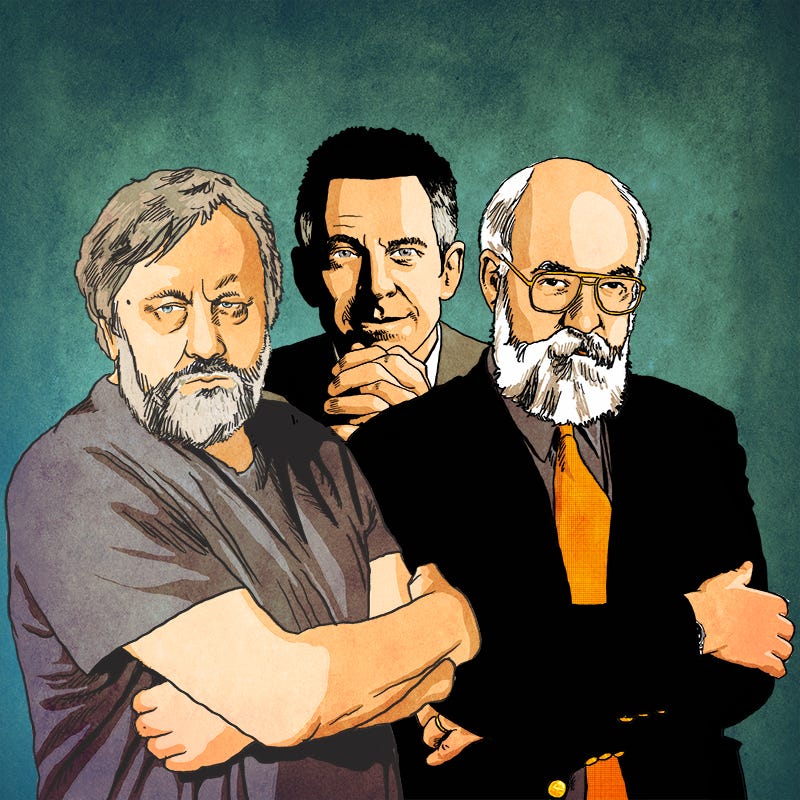
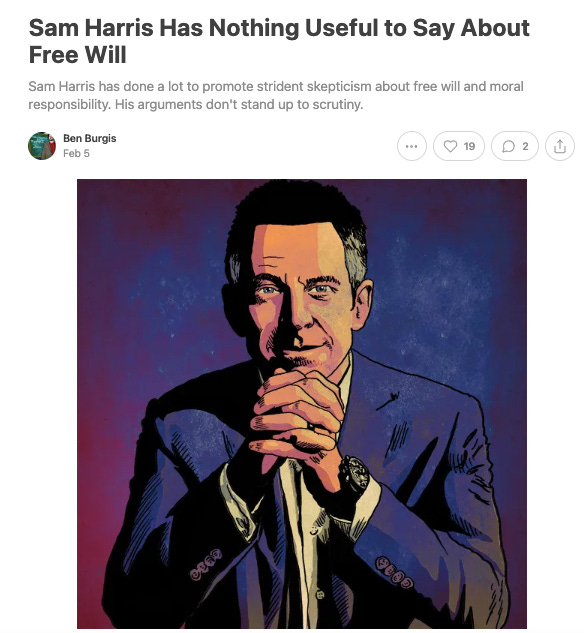
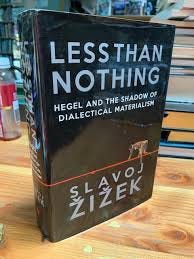
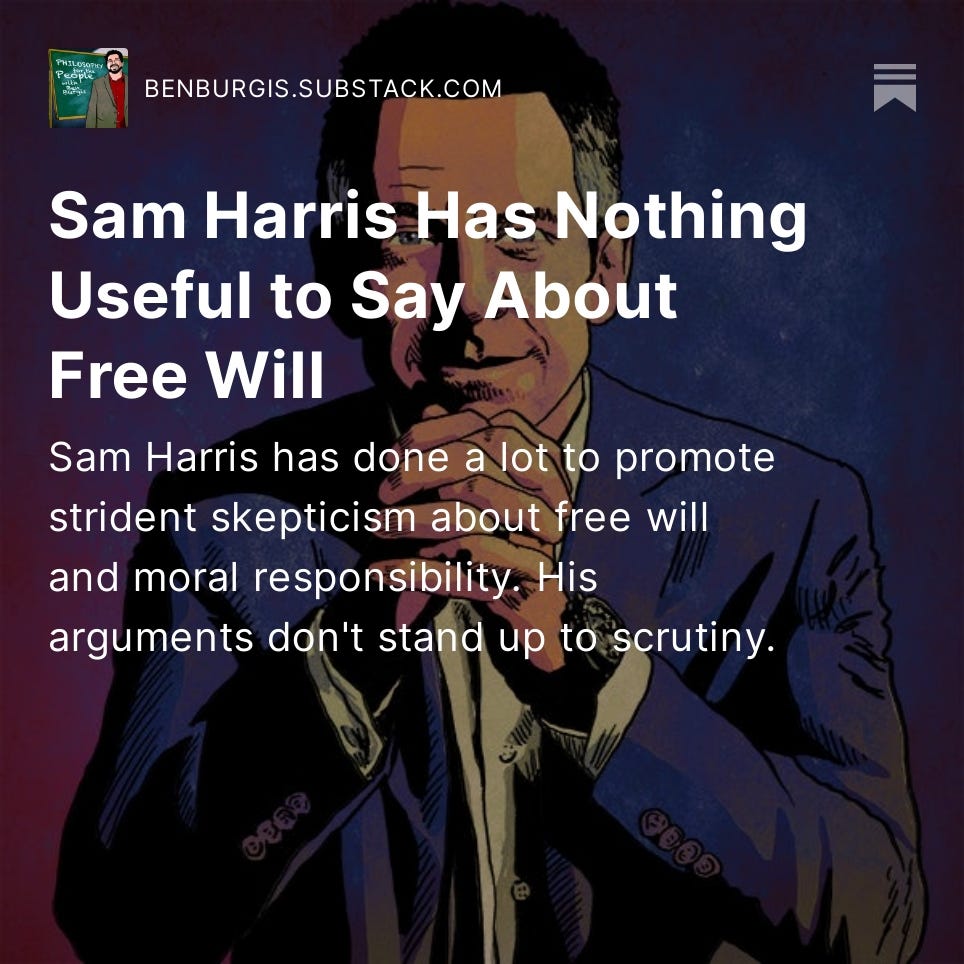
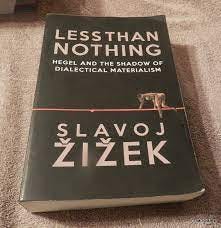
Extremely interesting read, thanks for duh post
I’d like to understand more about where you believe the idea of free will came from. To frame it one way: is the idea of moral responsibility a consequence of the felt experience of free will, or is free will derivative of the idea of moral responsibility? I enjoyed the piece, and realize you can only do so much in a single post, but I think this discussion benefits from broadening the horizon (especially time-wise, in the history of philosophy)